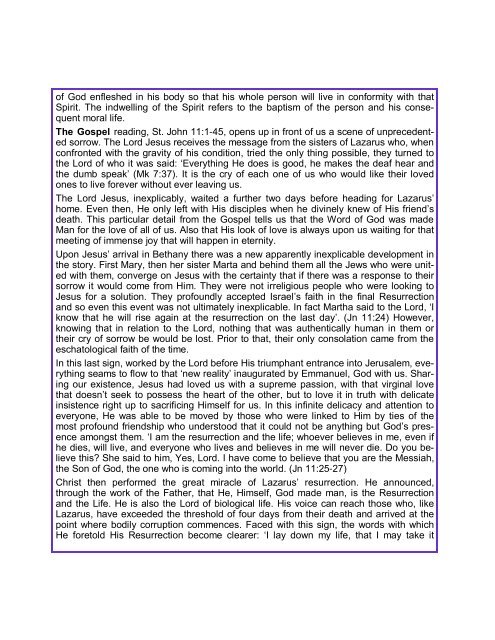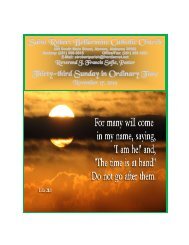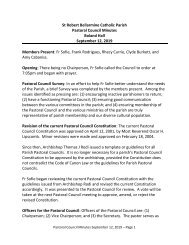Bulletin_20170402
Create successful ePaper yourself
Turn your PDF publications into a flip-book with our unique Google optimized e-Paper software.
of God enfleshed in his body so that his whole person will live in conformity with that<br />
Spirit. The indwelling of the Spirit refers to the baptism of the person and his consequent<br />
moral life.<br />
The Gospel reading, St. John 11:1-45, opens up in front of us a scene of unprecedented<br />
sorrow. The Lord Jesus receives the message from the sisters of Lazarus who, when<br />
confronted with the gravity of his condition, tried the only thing possible, they turned to<br />
the Lord of who it was said: ‘Everything He does is good, he makes the deaf hear and<br />
the dumb speak’ (Mk 7:37). It is the cry of each one of us who would like their loved<br />
ones to live forever without ever leaving us.<br />
The Lord Jesus, inexplicably, waited a further two days before heading for Lazarus’<br />
home. Even then, He only left with His disciples when he divinely knew of His friend’s<br />
death. This particular detail from the Gospel tells us that the Word of God was made<br />
Man for the love of all of us. Also that His look of love is always upon us waiting for that<br />
meeting of immense joy that will happen in eternity.<br />
Upon Jesus’ arrival in Bethany there was a new apparently inexplicable development in<br />
the story. First Mary, then her sister Marta and behind them all the Jews who were united<br />
with them, converge on Jesus with the certainty that if there was a response to their<br />
sorrow it would come from Him. They were not irreligious people who were looking to<br />
Jesus for a solution. They profoundly accepted Israel’s faith in the final Resurrection<br />
and so even this event was not ultimately inexplicable. In fact Martha said to the Lord, ‘I<br />
know that he will rise again at the resurrection on the last day’. (Jn 11:24) However,<br />
knowing that in relation to the Lord, nothing that was authentically human in them or<br />
their cry of sorrow be would be lost. Prior to that, their only consolation came from the<br />
eschatological faith of the time.<br />
In this last sign, worked by the Lord before His triumphant entrance into Jerusalem, everything<br />
seams to flow to that ‘new reality’ inaugurated by Emmanuel, God with us. Sharing<br />
our existence, Jesus had loved us with a supreme passion, with that virginal love<br />
that doesn’t seek to possess the heart of the other, but to love it in truth with delicate<br />
insistence right up to sacrificing Himself for us. In this infinite delicacy and attention to<br />
everyone, He was able to be moved by those who were linked to Him by ties of the<br />
most profound friendship who understood that it could not be anything but God’s presence<br />
amongst them. ‘I am the resurrection and the life; whoever believes in me, even if<br />
he dies, will live, and everyone who lives and believes in me will never die. Do you believe<br />
this? She said to him, Yes, Lord. I have come to believe that you are the Messiah,<br />
the Son of God, the one who is coming into the world. (Jn 11:25-27)<br />
Christ then performed the great miracle of Lazarus’ resurrection. He announced,<br />
through the work of the Father, that He, Himself, God made man, is the Resurrection<br />
and the Life. He is also the Lord of biological life. His voice can reach those who, like<br />
Lazarus, have exceeded the threshold of four days from their death and arrived at the<br />
point where bodily corruption commences. Faced with this sign, the words with which<br />
He foretold His Resurrection become clearer: ‘I lay down my life, that I may take it

















